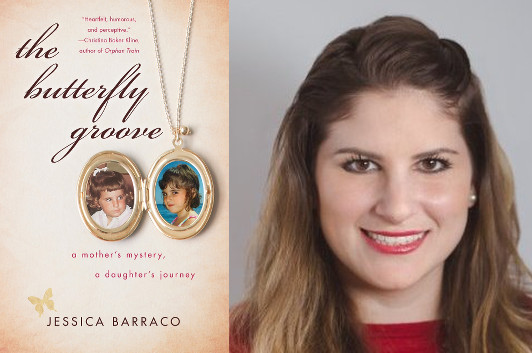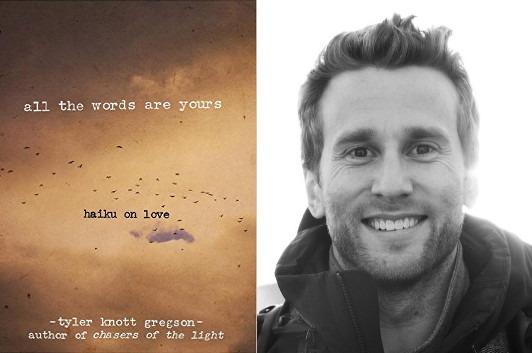Jessica Barraco: Moving Through Motherless Milestones

photo via Jessica Barraco
As Jessica Barraco says in the book trailer to her memoir, The Butterfly Groove, she always knew who her mother was—but because her mother had died when Jessica was still a young girl, there were many unanswered questions about the past that had made her who she was… and that’s what Jessica set out to investigate. In this guest essay, she explains how she hasn’t just filled out her understanding of her mother’s life; she’s also gained a richer understanding of how her mother continues to be a presence in her own life.
One year for a birthday present, someone gave me a vintage album of my mom’s favorite song: “Cherry Bomb” by John Mellencamp. It was beautiful, and such a collector’s item. The original recording happened to take place during the year and month I was born: August of 1987. It was meant to be a sweet gesture, but the truth was, my heart sunk and my eyes filled with tears, and I couldn’t understand how such a nice gesture could make me feel so distraught. The whole next day, I learned a harsh reality to losing my mom at twelve years old: Every happy moment in my life will be bittersweet. No matter the joy, it will inevitably sink in that my mother will not be there to enjoy whatever it is with me; to see me grow, to watch me smile; and that no matter how you slice it, that is so very sad.
Always being an ambitious person both personally and professionally, I often pictured milestones: my first job, book release, wedding, birth of my children. And I can’t think of any of these moments without seeing the obligatory empty chair that my mom should be filling. The daily phone call I don’t get to make that so many others take for granted. The reassuring glance I have almost forgotten. I can get easily overwhelmed imagining any one of these moments.
My mom passed away sixteen years ago after suffering from cancer and its horrendous complications for nearly twenty years of her life, and for all of mine. I learned a lot about my mom while researching and writing The Butterfly Groove, but I was also able to imagine how she handled her own life’s milestones. I am comforted by now knowing the true series of events in her life that I wasn’t aware of previously. Along with the truth, I was fortune enough to learn how these experiences both inspired and influenced her choices: whether positively, negatively, or seemingly not at all. I call it learning the emotional genealogy of a person. I always knew where I came from, but I wanted to know from whom I came from.
2 November 2015 | guest authors |
Tyler Knott Gregson: When I Heard Walt Whitman

photo via Tyler Knott Gregson
Every day, Tyler Knott Gregson writes a haiku on an old typewriter, and then shares it with fans online. And there’s a lot of them: hundreds of thousands spread out between Tumblr and Instagram alone, with more on other social media platforms. All the Words Are Yours collects some of what he’s shared online along with new work, plus some choice examples of his photography (that’s his day job). “I don’t ever want to be taught how to do something artistic, no matter what it is,” he once told an interviewer, “because I’m always worried that if I’m taught how to do it, I’ll do it like the person that taught me.” But, as you’ll learn in this guest post, inspiration is quite a different matter…
It was one, always one, that pushed me into love. I say pushed because it was forceful, it was unseen, and it took the wind out of me. I had read a few before, poems I was instructed to, guided through, and tested on, but none stuck. None felt whilst reading, how I felt while sitting, staring at blank blackboards, counting every tick of every clock within earshot, waiting for the classes to end. Then it came, as suddenly as the joy rises in his work, as clearly as his observation, and I was pushed into love.
Walt Whitman may seem like a cliché choice to mention as a poet that has helped shape the writer, and more, the man I am today, but like all great clichés, it’s true, and it’s honest. When I first read “When I Heard The Learn’d Astronomer,” something, and maybe it was the first something, made sense, and I for the first time felt like I did, as well. Being taught was something I struggled with, attention span lacks and boredom were things that I wrestled with every day of my school career, and reading this poem served as an introduction not only to Whitman and his entire way of seeing the world, but of being understood by someone, somewhere, even long since gone. Since the first reading, and every time I read it still, it makes me feel like maybe, just maybe the way I see the world isn’t so strange, that maybe it is okay to find miracles in all the mundane and simple things, that maybe walking in complete amazement at all times is a blessing, and not a curse to be corrected and normalized.
18 October 2015 | poets on poets |

 Our Endless and Proper Work is my new book with Belt Publishing about starting (and sticking to) a productive writing practice.
Our Endless and Proper Work is my new book with Belt Publishing about starting (and sticking to) a productive writing practice. 
